Getting the right lens is one of the most effective ways to take your photography or videography to the next level. The lenses on this last have a huge range, from affordable, beginner lens to expensive pro lens. No matter which one is interested in, each has their own benefits and drawbacks. When used effectively, each lens on this list will give you abilities that you previously lacked. Some factors to consider when purchasing a new lens: what kind of shots you want (telephoto or wide), how much low light or shallow depth of field do you need (the lower the f-number, the more light and more shallow depth of field the camera can capture), and whether or not you need other features like image stabilization.
Here are the top 10 best Canon lenses for beginners to pros.
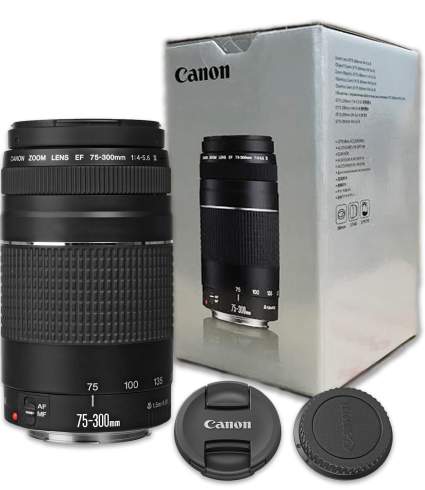
|
Amazon Customer Reviews
|
Price: $139.00 Shop at Amazon | Shop now Read our review |
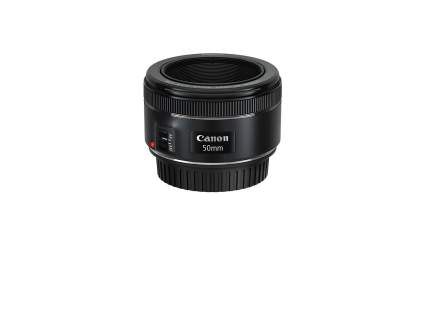
|
Amazon Customer Reviews
|
Price: $125.00 Shop at Amazon | Shop now Read our review |
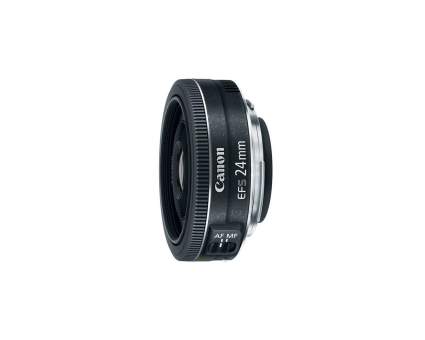
|
Amazon Customer Reviews
|
Price: $149.00 Shop at Amazon | Shop now Read our review |
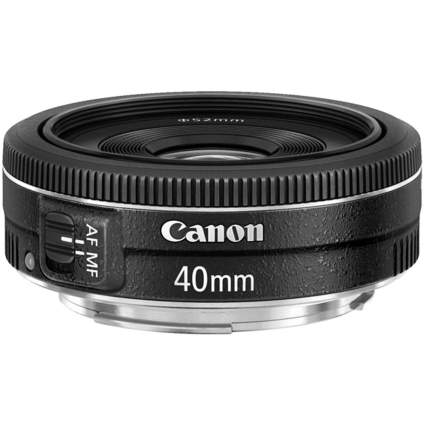
|
Amazon Customer Reviews
|
Price: $248.49 Shop at Amazon | Shop now Read our review |
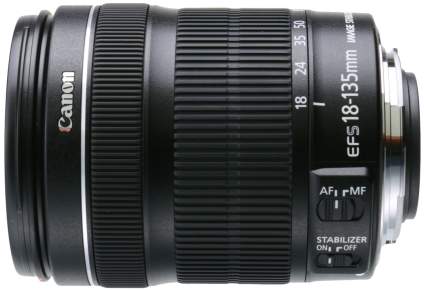
|
Amazon Customer Reviews
|
Price: $319.95 Shop at Amazon | Shop now Read our review |
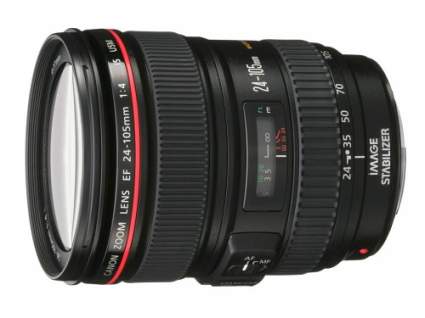
|
Amazon Customer Reviews
|
Price: $779.95 Shop at Amazon | Shop now Read our review |
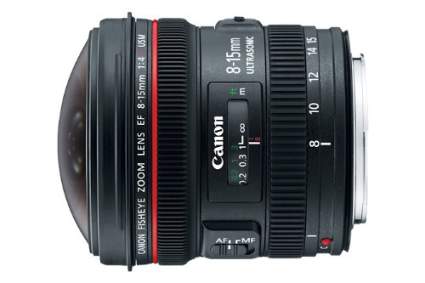
|
Amazon Customer Reviews
|
Price: $1,044.95 Shop at Amazon | Shop now Read our review |
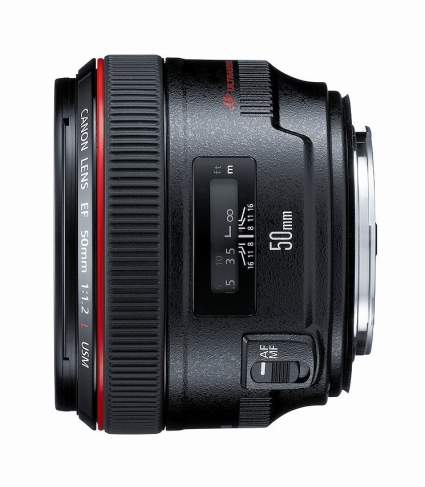
|
Amazon Customer Reviews
|
Price: $1,399.00 Shop at Amazon | Shop now Read our review |
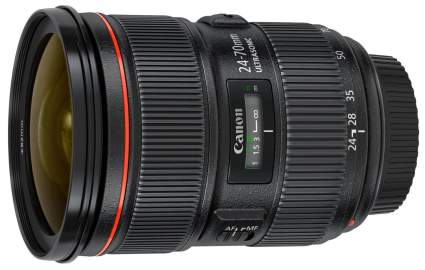
|
Amazon Customer Reviews
|
Price: $1,899.00 Shop at Amazon | Shop now Read our review |
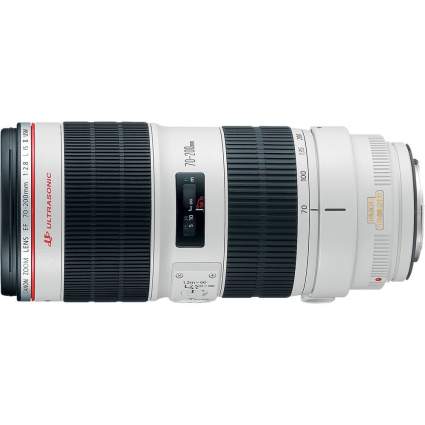
|
Amazon Customer Reviews
|
Price: $2,049.00 Shop at Amazon | Shop now Read our review |
-
1. Canon 75-300mm f4-5.6
Pros:- Fantastic range at a great price
- High quality construction
- Includes 1 year warranty from Canon
- Optical quality is solid
Cons:- Minimum focusing distance is greater than four feet, won’t work for macro shots
- Lack of image stabilization means some shots can be extremely challenging, anytime the shutter speed isn’t very fast
- Takes patience
Don’t be fooled by this lens’ affordable price, it’s got great sharpness, good optics, and a range that allows for a lot of reach. It may lack image stabilization, but at $79, this lens is perfect for beginners and even more experienced photographers to get a grip on telephoto shooting. The build quality is great and the zooming is smooth. If one needs stabilization, it could be combined with a three-axis gimbal stabilizer for taking smooth shots and video. This lens isn’t the best money can buy, but its value is extremely hard to beat for such a low price.
Find more Canon EF 75-300mm information and reviews here.
-
2. Canon 50mm f1.8 STM
Pros:- STM motor is much quieter than older model motor
- Superb image quality is sharp and largely free of aberration
- Autofocus is quick and on point
- Bokeh has a great aesthetic quality
Cons:- Motor isn’t silent, can be heard through on-camera mic, for instance
- Optical quality while improved is not likely worth a purchase for owners of old nifty fifty
- Mic picks up camera noises with video
This update to the classic “nifty fifty” adds improved optics, a quiet STM motor, and keeps the same amazing price. For those who are unacquainted with how great the optics are, this lens has much better quality than the much more expensive Canon 50mm f1.4. By DXOMark’s standard, the f1.8 is a much better lens than the f1.4(DXOMark).
Another advantage of the stepper motor is that this lens works much better for video shooter because it works with video autofocus. The fact that the motor is quieter helps too. If you don’t already own a nifty fifty, this lens is an absolute must. For users who already have the old version, it’s a solid update, but may not be worth your while unless you need video autofocus.
Find more Canon 50mm f1.8 STM information and reviews here.
-
3. EFS 24mm f2.8 STM (Stepper motor, Pancake Lens)
Pros:- Great images, small size, at an affordable price
- Short focusing distance of 6 inches means the lens can be used as a pseudo macro lens
- Great construction and build quality
Cons:- Focusing sounds during video shooting can be distracting
- A few users found it to be insufficiently sharp
- Not as good as an actual macro lens
For those looking for a great wide-angle lens and who want to make their camera a bit smaller, the 24mm pancake lens is a top choice. At a mere $129, it boasts tight optical quality, a low weight, and on most APS-C cameras, the somewhat extreme width is a more reasonable 38mm. Users love its optics and ability to be used as a pseudo macro lens (can focus at a mere six inches).
Find more EF-s 24mm f2.8 information and reviews here.
-
4. Ef 40mm f2.8 STM
Pros:- Extremely light lens is easy to carry
- Sharp with little chromatic aberration
- STM (stepping motor) is quiet
- Minimum focusing distance of eleven inches mean it can be used somewhat for macro photography
Cons:- Hard to take off camera
- Some users found focusing difficult
- Very few users had issues with the optical quality
Slightly more zoomed in than its wider brother, the 40mm f2.8 pancake offers users a nice, fast and decently tight lens. Boasting a quiet STM (stepper motor) and manual focusing, this is a solid lens for users looking for a light lens with a very usable focal length. That said, for those seeking better optical quality, the 50mm is better. However, if one prioritizes low weight, this will be a better choice.
Find more Ef 40mm f2.8 STM information and reviews here.
-
5. Canon EF-S 18-135mm f3.5-5.6 STM (Stepper motor)
Pros:- Focus is fast and quiet
- Praised as great for sports photography
- Great all around piece of glass
- Minimum focusing distance of 1.3 feet means it can be used for macro photography
Cons:- Lens is on the large side for some users
- Some users thought image quality was lacking
- Bulky
This versatile lens is great for video given its large range and built-in image stabilization (up to four stops). The lens works with AF servo mode on Canon DSLRs meaning it’s great for video focusing. The worst anyone can say about it is that it’s a bit large, but the optical quality, versatility, image stabilization, build quality and full time manual make it a must for any user looking to add to their kit.
Find more Canon EF-S 18-135mm STM information and reviews here.
-
6. 24-105mm f4 IS (Zoom lens)
Pros:- Great zoom range
- Three stops of image stabilization
- Quiet autofocus with ultrasonic motor
- One year warranty, dust and moisture resistant
Cons:- One stop more slow than f2.8
- 1.5 lbs isn’t exactly light
- Expensive
This is one of the best all-around lenses one could buy. It has exactly one shortcoming: f4.0 isn’t all that fast. Outside of this however, this lens has a versatile zoom range, tack sharp images, and the ability to zoom in and out during video. It’s often used by video shooters because of its fixed aperture (allowing one to maintain consistent lighting). It may not be the fastest lens out there, but it’s one of the most practical.
Find more 24-105mm f4 lens information and reviews here.
-
7. Canon 8–15mm f4L EF (Zoom lens, wide angle to fisheye)
Pros:- Stunning wide angle and fisheye photos
- Fast autofocus, even in low light
- Weather-resistant and dustproof
- High quality focusing and zooming rings
Cons:- On the heavy side
- Lens cover is frustrating, tends to pop off. Be sure to secure it
- Some chromatic aberration when there is large dynamic range between background and subject
For those on the prowl for a wide angle and fisheye lens, this is about as good as it gets. Boasting a fixed f4 aperture and awesome optics, it doesn’t get better for Canon cameras at this focal length. While one can get cheaper fish eye lenses, due to the complexity of this kind of glass, cheaper lenses tend to look soft and GoPro like. This lens is sharp and the optics really pop. It’s great for things like real estate photography and any situation where one wants to stress the expansiveness of a property or place.
Find more Canon 8–15mm f4L EF information and reviews here.
-
8. 50mm f1.2 (Prime lens)
Pros:- Best portrait lens in the game (though some may argue it’s the 85mm f1.2)
- f1.2 is lightning fast
- On GH4 or GH5, f1.2 is less soft and depth of field is deeper, but lens still lets in plenty of light
- All the way open, has wonderful dreamlike quality
- Razor sharp at f2.8
Cons:- 10 times the price of a nifty fifty, not 10 times the quality
- Some could call it a one trick pony, but it’s not really
- Pricey
For low light or portrait photography, the f1.2 is simply the gold standard. For a lens that does only one focal length (aka a prime lens), many users are shocked at its large weight. Well, it’s a lot of glass for a lot of optical quality. It may be a “one-trick pony,” but the images are unbelievably sharp at f2.8. At f1.2, they have a dreamy, beautiful quality. Another perk of this lens is for cameras with small sensors (GH4 and GH5), f1.2 will be less soft and will allow in huge amounts of lights. This is a great lens for those who want to take superb portraits or capture the most amount of light possible with pristine optics.
-
9. 24-70mm f2.8 IS II (Fast zoom lens)
Pros:- Best All Around Lens
- Superior Image Quality
- Fast Autofocus
Cons:- On the heavy side
- Some users found themselves wanting just a bit more reach than 70mm
- Pricey
Comparing to the 24-105mm f4, this lens takes away some of its reach, but steps down a full stop to 2.8. The result is that while one may not be able to see as far, this lens ends up being a better all around choice for some. F2.8 means portraiture is doable and this lens can handle low light shooting. It’s also much sharper than the f4. Users love its image quality and speed. The image stabilization is also top tier.
-
10. 70-200mm f2.8 IS II (Zoom lens)
Pros:- Outstanding image quality
- f2.8 leads to decent low light performance and tack sharp images
- Multiple stabilization modes allow one to use IS to their advantage in variety of situations
- Pretty quiet focusing motor
Cons:- 2.9lbs is a lot of weight to carry around
- Overkill for all but professionals and those in need of high optical quality
- Pricey
This is a world class lens. With a USM motor (ultrasonic), unreal optics, and fast aperture, this is a go-to choice for sports photographers and anyone seeking top optical quality from a distance. There are no real downsides to this lens beyond its high price and weight, but that’s to be expected for images of this quality. The image stabilization has a variety of modes and is good for up to four stops. In short, for people who need a lens with great reach and pro optics, this is the one.